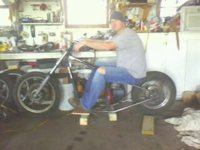What was the stock compression ratios on a air cooled VW?
On the earlier models. 70-71-72 they played with the compression ratio. They started with an 8.7 - 1 nd found it to perform well but had excess vibration. They cut 1.2 mm off the top of the piston to drop the ratio to 8.1 - 1. This greatly cut vibration without much power loss.
On the later models they adjusted compression ratio until they decided on the 8.4 - 1 they used.
Dropping to 8.1 - 1 won't hurt the power much, seeing as how the gas is nowdays. It can help vibes. With the timing retard the low end torque is increased. The torque increase helps in the rpms the bike runs at much more than the 1 or so HP you loose above 7000 rpms.
Leo
Not going to argue with that at all.
VW, like all car manufacturers selling to the US marketplace, was under increased pressure starting around 1968-69 to reduce emissions. The regulations became exponentially more strict in the early to mid 70's causing engineers to scramble with any tools they had to make the cars run leaner and cleaner. By 1975 compression was only 7.4:1 as the first year of the electronic fuel injected Beetles arrived here. Reducing compression was but one of the less expensive methods of allowing them to run leaner, but like all new technology, it's expensive to deploy due to R&D and time constraints required to continuously make improvements. VW struggled with all sorts of problems attempting to stay compliant while supplying the public with a consumer friendly, reliable, product, and so caved to finally a complete departure from air cooled products to the States by 1978. Sales had plummeted on the Beetle with the masses turning strongly to the Far East in search of a "better" peoples' car.
I was working as a VW technician for a major dealer here in the US during those years, and even we were all big eyed with the introduction of the new VW water cooled car lines. It was a strange transition for the seller, the technician, and especially the buyer, as none were quite sure what to make of the new VW's. Even though it seemed like the right thing for VW to do at the time, business was never quite the same after the introduction of the new era, so I ventured off on my own, and continued independently building air cooled engines for VW customers for another decade into the mid 1980's, all the while experimenting with higher compression ratios within the constraints of keeping the engine in one piece. I still have some old, new parts left over to this date, but the world has completely changed, and so I had to follow. I literally went from building high performance, air cooled VW's for the street to helping build blown alcohol, big block Chevy motors for the strip. So... eh... it's all the same, basically. You build to spec for whatever you plan the engine to do for you... run fast, or run forever. I always strived to achieve both, so there are compromises.
Wow, I guess we got way off track here, but it's too cold to go outside!
-R




